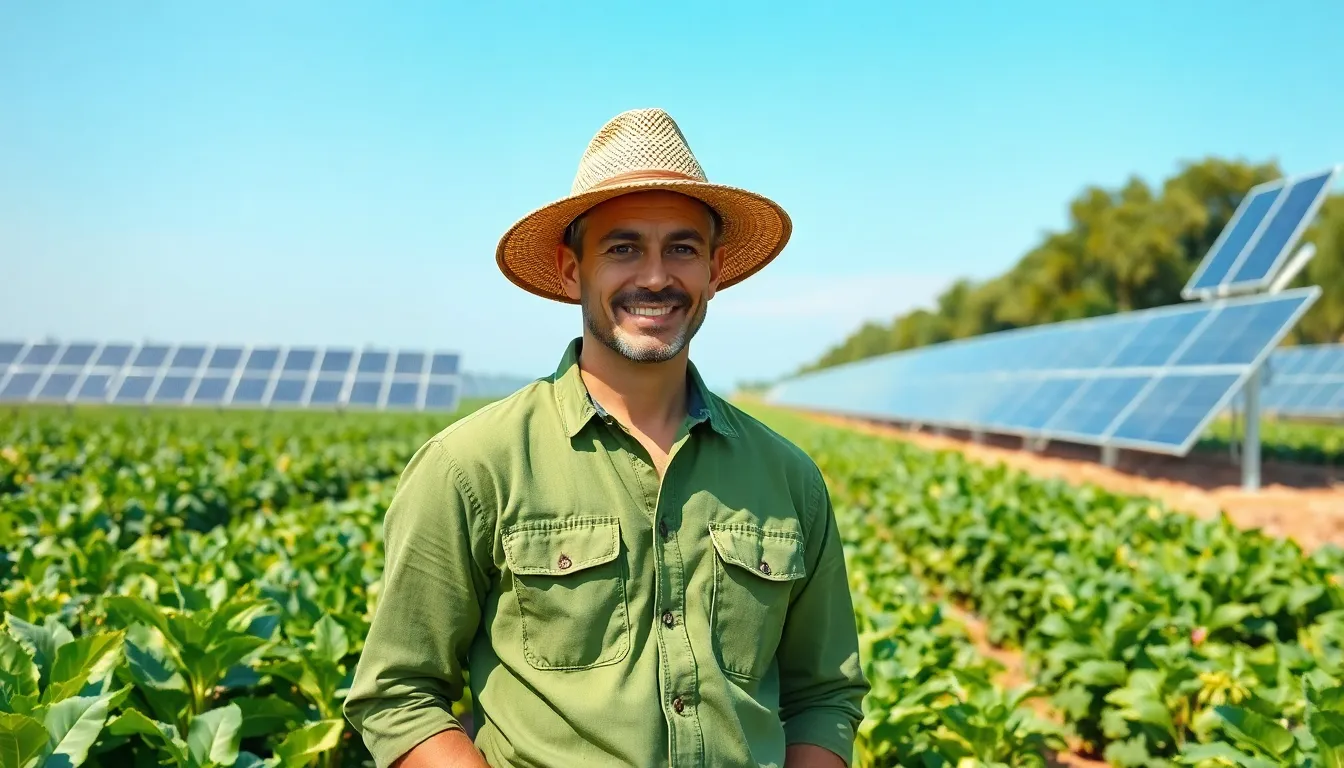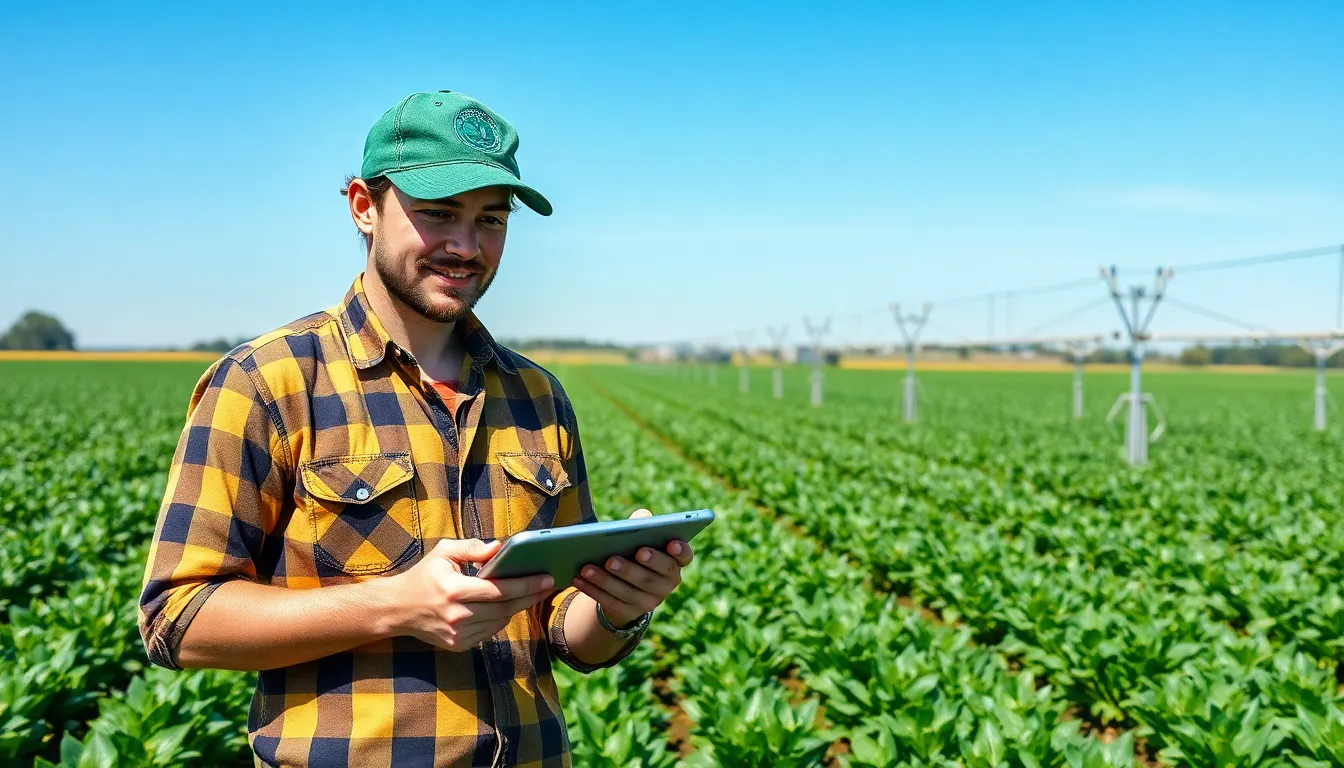In a world where the phrase “you are what you eat” takes on a whole new meaning, sustainable farming technology is the superhero we didn’t know we needed. Picture this: farms that not only grow delicious crops but also save the planet one carrot at a time. It’s like Mother Nature finally got a tech upgrade, and she’s loving it.
Table of Contents
ToggleOverview of Sustainable Farming Technology
Sustainable farming technology encompasses various innovative practices and tools designed to enhance agricultural efficiency while minimizing environmental impact. Precision agriculture employs advanced data analysis and monitoring techniques to optimize crop yields and resource use. By utilizing sensors and drones, farmers can monitor soil moisture and health, ensuring plants receive adequate nutrients.
Aquaponics combines aquaculture and farming to create a symbiotic environment. This method improves water efficiency, allowing for significant reductions in resource consumption. Crop rotation promotes biodiversity and soil health, mitigating pest and disease prevalence and fostering a resilient ecosystem.
Biological pest control methods utilize natural predators to manage pests, minimizing reliance on chemical pesticides. Integrating renewable energy sources, such as solar and wind power, significantly reduces greenhouse gas emissions in farming operations. Vertical farming optimizes space usage and allows for year-round cultivation, especially in urban settings.
Advanced irrigation techniques, including drip and subsurface irrigation, conserve water and deliver nutrients directly to roots. Sustainable farming methods often incorporate organic practices, which improve soil structure and support sustainable ecosystems. The adoption of genetically modified organisms (GMOs) designed for drought resistance contributes to food security in varying climates.
Farm management software aids in decision-making by analyzing data related to weather patterns, crop performance, and market trends. Such comprehensive approaches ultimately support a growing population while maintaining ecological balance. Sustainable farming technology reflects a commitment to responsible stewardship of natural resources, aligning agricultural practices with environmental preservation.
Benefits of Sustainable Farming Technology

Sustainable farming technology yields numerous benefits, influencing economic growth and environmental health positively.
Economic Advantages
Sustainable farming technology enhances profitability through reduced operational costs. Farming practices like precision agriculture optimize inputs such as seeds and fertilizers, leading to higher crop yields. Improved efficiency increases income per acre significantly. Implementing renewable energy solutions, such as solar panels, can minimize energy expenses and provide long-term cost savings. Furthermore, farm management software streamlines operations, aiding in resource allocation and waste reduction. Various studies demonstrate that farms adopting sustainable methods experience a return on investment that outperforms conventional approaches.
Environmental Impact
Sustainable farming technology fosters environmental preservation and biodiversity. Techniques like crop rotation enhance soil fertility and reduce erosion, promoting healthier ecosystems. Water conservation methods, such as drip irrigation, limit waste while maximizing hydration for crops. Biological pest control methods decrease reliance on harmful pesticides, protecting pollinators and other beneficial organisms. Integrating renewable energy contributes to lower greenhouse gas emissions. Research indicates that adopting these technologies can reduce farming’s carbon footprint, significantly benefiting the planet’s health and resilience.
Types of Sustainable Farming Technologies
Sustainable farming technologies encompass a range of methods and tools aimed at improving agricultural practices while protecting the environment. These innovations enhance efficiency and mitigate ecological impacts.
Precision Agriculture
Precision agriculture employs advanced technologies to monitor and manage crop production. Sensors, GPS, and data analytics contribute significantly to optimizing resource use. Farmers implement variable rate technology for fertilizers and water, leading to better yields while minimizing waste. Real-time data helps in making informed decisions, ultimately promoting sustainability.
Hydroponics and Aquaponics
Hydroponics utilizes nutrient-rich water solutions to grow plants without soil. This method significantly conserves water, using nearly 90% less than traditional farming. Aquaponics takes it further by combining fish farming with plant cultivation, creating an ecosystem where fish waste provides nutrients for plants. Both systems maximize space efficiency and result in fresh produce with lower environmental footprints.
Renewable Energy Solutions
Renewable energy solutions form a key component of sustainable farming. Solar panels and wind turbines generate clean energy for running farm operations. Farmers leverage this energy for irrigation systems, greenhouses, and livestock facilities, reducing reliance on fossil fuels. Implementing renewable energy reduces operational costs and minimizes greenhouse gas emissions, contributing to ecological resilience.
Challenges in Implementing Sustainable Farming Technology
Adopting sustainable farming technology presents several challenges. Cost and accessibility significantly impact farmers’ ability to implement these innovations.
Cost and Accessibility
Investment in sustainable technology often requires substantial financial resources. Many farmers find initial costs prohibitive, especially small-scale operators who lack capital. Access to advanced tools like precision agriculture equipment may also be limited in rural areas. Availability of funding and grants varies widely, which can deter adoption. Economics play a vital role; without clear financial incentives, some farmers may hesitate to transition to more sustainable practices. Identifying solutions to improve access to affordable technology remains essential for widespread implementation.
Education and Training
Proper education and training are crucial for successful integration of sustainable practices. Many operators lack knowledge about new technologies and their benefits. Workshops and online resources can bridge this gap, but access to these educational opportunities may be uneven. Moreover, ongoing support and training are necessary for farmers to adapt to changing techniques and tools. When farmers receive adequate resources, their confidence in using sustainable technologies increases significantly. Prioritizing education efforts can empower farmers and boost the efficiency of sustainable farming practices.
Future Trends in Sustainable Farming Technology
Emerging trends in sustainable farming technology continue to reshape agricultural practices. Artificial intelligence and machine learning play significant roles, enabling farmers to predict planting and harvesting times more accurately. Remote sensing technology enhances monitoring of crop health, allowing for timely interventions.
Drones are increasingly utilized for field surveying and crop management. These unmanned aerial vehicles provide a comprehensive view of farmland, helping farmers identify issues like pest infestations or nutrient deficiencies early on. Robotics also make an impact, with automated harvesters and planters minimizing labor costs and maximizing efficiency.
Blockchain technology is transforming supply chain transparency. By tracking crop provenance, consumers gain confidence in the sustainability of their food. Vertical farming is on the rise in urban areas, optimizing space and reducing transportation emissions through localized food production.
Augmented reality offers innovative training solutions for farmers. Through immersive experiences, agricultural workers gain hands-on knowledge of new technologies without the risk of trial and error in the field. Soil health sensors further contribute by providing real-time data on nutrient levels, supporting informed decisions about fertilization and irrigation.
Regenerative agriculture practices are gaining momentum, focusing on restoring soil health and biodiversity. Emphasis on carbon sequestration through cover crops and no-till methods addresses climate change challenges. As these trends evolve, partnerships between tech companies and agricultural organizations are crucial for developing actionable solutions.
Investments in research and development are essential to advance these technologies, making them more accessible to farmers of all sizes. Governments and private sectors have begun prioritizing funding programs to foster innovation in sustainable farming. Collaboration among stakeholders facilitates knowledge sharing and accelerates the adoption of sustainable practices.
Sustainable farming technology stands as a beacon of hope for the agricultural sector. By integrating innovative practices and tools farmers can enhance productivity while safeguarding the environment. The advancements in precision agriculture aquaponics and renewable energy showcase the potential for a more efficient and eco-friendly approach to farming.
However the journey toward widespread adoption requires addressing challenges such as funding and education. Empowering farmers with the necessary resources and knowledge is crucial for the successful implementation of these technologies. As the industry evolves collaboration among stakeholders and investments in research will play a pivotal role in shaping a sustainable future for agriculture. Embracing these technologies not only benefits farmers but also ensures a healthier planet for generations to come.

